On November 27th the BBC News website published a report by Nafiseh Kohnavard of BBC Persian which remained on its ‘Middle East’ page for over a week. Headlined “Israel-Lebanon border: The Irish troops watching Israel’s hidden conflict”, that report appears to be the product of a day-trip for journalists with UNIFIL forces.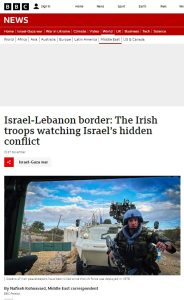
BBC audiences are told that:
“The UN peacekeeping mission, known as Unifil, is responsible for monitoring the Blue Line, the unofficial frontier between Lebanon and Israel.”
Kohnavard refrains from informing her readers that the Blue Line was created by the United Nations itself in June 2000 as a “line of withdrawal” to confirm the exit of Israeli forces from Lebanon. Neither does she clarify that UNIFIL’s mandate (last renewed in August 2023) includes more than just “monitoring the Blue Line”: among other tasks it is supposed to:
“Assist the Lebanese Armed Forces (LAF) in taking steps towards the establishment between the Blue Line and the Litani river of an area free of any armed personnel, assets and weapons other than those of the Government of Lebanon and of UNIFIL deployed in this area.”
And:
“…to take all necessary action in areas of deployment of its forces and as it deems within its capabilities, to ensure that its area of operations is not utilized for hostile activities of any kind…”
Kohnavard’s failure to mention UN SC resolution 1701 even once in her report will not come as a surprise to anyone familiar with the BBC’s serial omissions on that topic and its recurrent failure to inform audiences that according to that resolution, Hizballah forces and those of any other armed militias are not supposed to be anywhere near the border with Israel.
“Calls for […] security arrangements to prevent the resumption of hostilities, including the establishment between the Blue Line and the Litani river of an area free of any armed personnel, assets and weapons other than those of the Government of Lebanon and of UNIFIL as authorized in paragraph 11, deployed in this area;”
The absence of that crucial context compromises the ability of readers to fully comprehend some of the statements made by Kohnavard in her report: [emphasis added]
“During the last four decades the area has witnessed on and off clashes between the Lebanese Shia Muslim militant group, Hezbollah, and the Israeli army.”
“The Unifil troops have recovered the bodies of people killed in the fighting but cannot say how many were Hezbollah fighters due to the sensitivity of their mission and the need to remain neutral between the warring parties.
“It is not our job to comment on these, just observe, monitor and report what we see to our headquarters,” Lieutenant Cadogan says.”
“Since Israel launched its offensive on Gaza following Hamas’s attack on 7 October, Hezbollah has regularly carried out rocket and drone attacks from southern Lebanon, some aimed at military targets, others fired more indiscriminately into northern Israel.”
“Approaching the nearby town of Tebnine, posters of Hezbollah leader Sheikh Hassan Nasrallah and fallen Hezbollah fighters line the road.
It’s 10km (6.2 miles) from the Blue Line and has been heavily damaged in previous conflicts.
Like most of the towns and villages in southern Lebanon, Hezbollah is very influential here and controls security in the area.”
Had readers been told that according to UN SC resolution 1701 armed terrorist organisations such as Hizballah and Hamas (which Kohnavard fails to mention despite it also having carried out attacks from Lebanon in recent weeks) should not be located in the area, their comprehension of the failure of UNIFIL to meet its mission would of course have been greatly enhanced.
Kohnavard’s ‘explanation’ for describing the Iranian proxy terrorist organisation Hizballah as a “Lebanese Shia Muslim militant group” is as follows:
“While Hezbollah is labelled a terrorist organisation by the UK, US and others, it is a mainstream political party in Lebanon, leading an alliance which fell just short of a majority in the national parliament in elections last year.”
Notably, Kohnavard fails to make any mention of repeated Hizballah provocations prior to October 7th beyond her vague and tepid reference to “on and off clashes”. Its digging of cross-border tunnels, its employment of an ‘environmental’ NGO in order to set up positions close to the border under the nose of UNIFIL and its repeated violations over recent months are absent from her report, as is Hizballah’s involvement in the killing of an Irish soldier last December.
“Since then, more than 300 peacekeepers have been killed, 48 of them Irish, something which is on the minds of the troops’ families.”
Another noteworthy statement in Kohnavard’s report reads as follows:
“Due to the fighting 60,000 people have been displaced from the border area on the Lebanese side, while thousands of Israelis have been evacuated from northern Israel.”
As reported by the BBC at the time, in mid-October the residents of 28 communities – around 27,000 people – were evacuated by the Israeli authorities. Later in the month (as the BBC also knows) the city of Kiryat Shmona (around 22,000 residents) was also evacuated along fourteen additional communities with a total population of around 11,000. In other words, the number of people displaced on the Israeli side of the border is at least the same as “on the Lebanese side” (and likely more because some residents in the area chose to evacuate despite not having been officially instructed to do so) but that point is not made clear in Kohnavard’s report.
Throughout her entire report Kohnavard fails to provide any information which would help readers to understand that bizarre reference to “Israel’s hidden conflict” in its headline. Although the BBC has produced relatively little stand-alone coverage of attacks by Lebanon-based terrorists (and Israel’s responses to them), the Israeli authorities and the IDF put out daily updates concerning incidents in northern Israel and other media organisations regularly report from the area.
In contrast, the BBC, for example, only managed to produce four sentences on its live page about a Hizballah attack on December 3rd in which twelve Israelis were wounded.
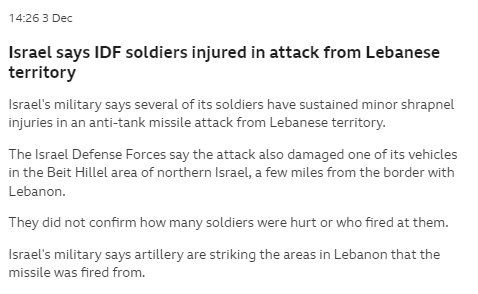
Likewise, the description of a conflict initiated by terrorist organisations acting from a sovereign country’s territory as “Israel’s” does nothing to persuade audiences of the BBC’s impartiality.

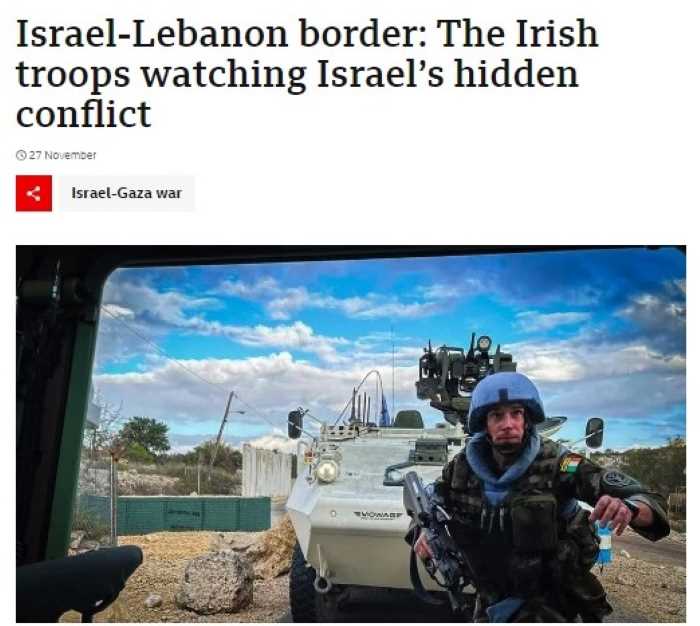

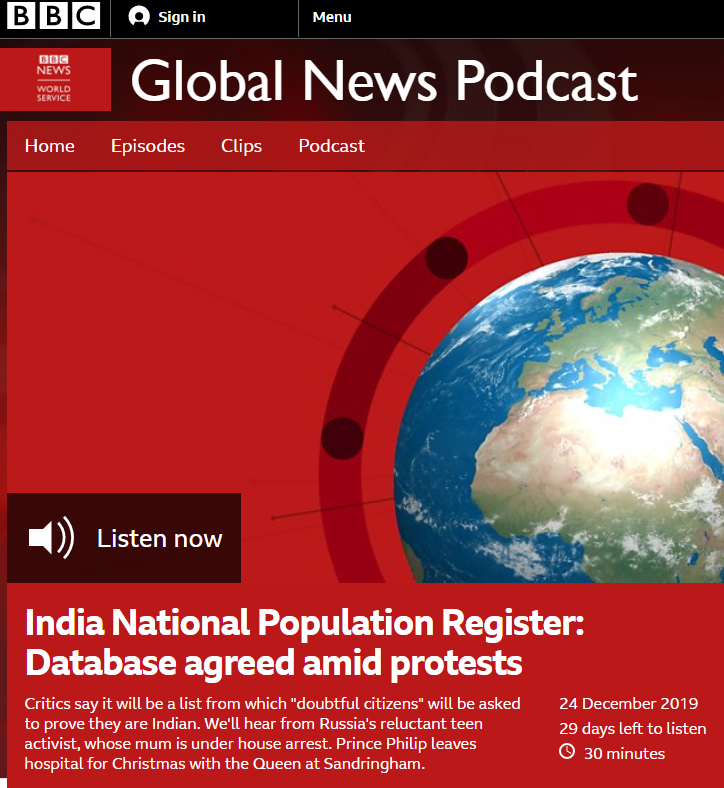
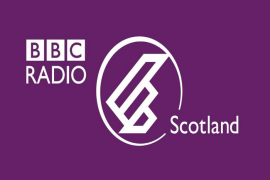

UNIFIL have been complicit in allowing Hezbollah to create their own terror enclave in Southern Lebanon when the whole purpose of their existence was to stop that. Yet another example of a failed and grossly incompetent UN organisation. Of course being manned by Irish troops no doubt they were following in the Nazi loving footsteps of their forefathers #defundthebbc